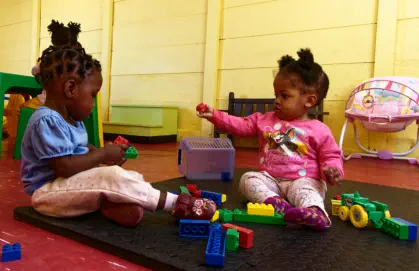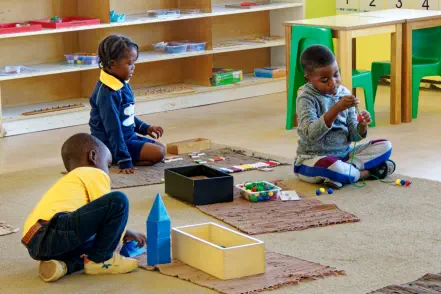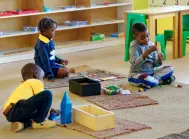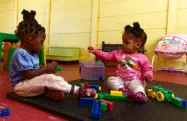NEDBANK NAMIBIA · ACCOUNT NO. 11990522989 · BRANCH CODE 461-038 · SWIFT CODE NEDSNANX

5. Social Environment
Where
there
is
freedom
to
interact,
children
learn
to
encourage
and
develop
a
sense
of
compassion
and
empathy
for
others.
As
children
develop,
they
become
more
socially
aware,
preparing
to
work
and
play
in
groups.
This
social
interaction
is
supported
throughout
the
environment
and
is
encouraged
with
the
nature
of
multi-age classroom settings.
6. Intellectual Environment
If
the
above
aspects
are
not
recognized,
the
intellectual
environment
will
not
reach
its
purpose.
The
purpose
of
the
Montessori
environment
is
to
develop
the
whole
personality
of
the
child,
not
merely
his
intellect.
By
guiding
the
child
through
the
five
areas
of
the
Montessori
curriculum
(Practical
Life,
Sensorial,
Language,
Mathematics,
and
Cultural
subjects),
the
child
has
the
structure,
which
is
at
the
forefront
of
the
creative
work
in a Montessori classroom.
A
lot
of
time
and
effort
is
involved
in
creating
a
prepared
Montessori
classroom
that
is
designed
to
meet
the
individual
needs of all children.
Through
developmentally
appropriate,
sensorial
material
that
moves
hierarchically
from
simple
to
complex
and
concrete
to
abstract,
children
are
given
the
freedom
to
fully
develop
their
unique
potential
through
a
carefully
prepared
learning environment.




NEDBANK NAMIBIA · ACCOUNT NO. 11990522989 · BRANCH CODE 461-038 · SWIFT CODE NEDSNANX

5. Social Environment
Where
there
is
freedom
to
interact,
children
learn
to
encourage
and
develop
a
sense
of
compassion
and
empathy
for
others.
As
children
develop,
they
become
more
socially
aware,
preparing
to
work
and
play
in
groups.
This
social
interaction
is
supported
throughout
the
environment
and
is
encouraged
with
the
nature
of
multi-age
classroom
settings.
6. Intellectual Environment
If
the
above
aspects
are
not
recognized,
the
intellectual
environment
will
not
reach
its
purpose.
The
purpose
of
the
Montessori
environment
is
to
develop
the
whole
personality
of
the
child,
not
merely
his
intellect.
By
guiding
the
child
through
the
five
areas
of
the
Montessori
curriculum
(Practical
Life,
Sensorial,
Language,
Mathematics,
and
Cultural
subjects),
the
child
has
the
structure,
which
is
at
the
forefront
of
the
creative
work
in
a
Montessori
classroom.
A
lot
of
time
and
effort
is
involved
in
creating
a
prepared
Montessori
classroom
that
is
designed
to
meet
the
individual needs of all children.
Through
developmentally
appropriate,
sensorial
material
that
moves
hierarchically
from
simple
to
complex
and
concrete
to
abstract,
children
are
given
the
freedom
to
fully
develop
their
unique
potential
through
a
carefully
prepared
learning environment.

































